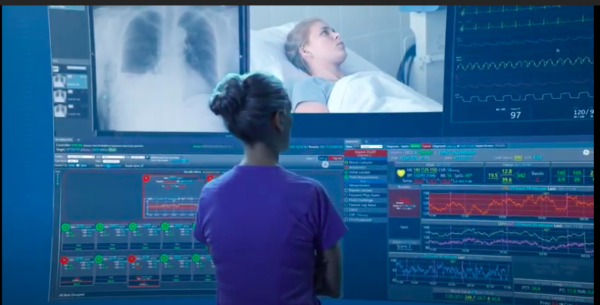If one word can encapsulate Covid-19 in the U.S., it’s shortages. Providers have had to deal with shortages of N95 masks, of personal protective equipment, ventilators and while those woes seem to have slightly abated in recent days, there is an ongoing shortage of tests.
Soon, there might be a shortage of the very healthcare professionals as more and more test positive for the deadly virus — some believe it is even higher than the 9,200, reported so far. Into this dynamic, GE Healthcare and Microsoft are launching a new software-as-a-service product that reduces the burden on professionals by allowing them to care for multiple ICU patients, — including those who are ventilated — simultaneously and remotely.. Remotely being able to monitor ICU patients can also reduce clinician exposure to these severely ill Covid-19 patients.
The solution — called Mural Virtual Care — traditionally requires an IT installation on the hospital premise. But now with the partnership with Microsoft announced Wednesday, the Seattle tech’s firm’s cloud capabilities are being brought to bear on the virtual ICU care tool, said Sadiq Syed, general manager for Clinical Care Solutions Digital at GE Healthcare, in an email forwarded by a GE Healthcare spokesman.
Specifically, the vendor-agnostic software is able to pull near real-time data from ventilators, patient monitoring systems, electronic medical records, labs and other systems such as pharmacy systems and can be customized for what a hospital needs. That data is displayed into a single pane of glass for each patient, thereby allowing one clinician to monitor multiple patients. This remote capability helps to supplement the existing bedside monitoring devices in patients’ rooms. Typically, three nurses and two intensivists monitor a Mural installation across a 100-bed multi-site ICU network around the clock.
“Now more than ever we need to manage a greater number of ventilated patients with limited resources,” said Microsoft Global Chief Medical Officer David Rhew in a news release. “Mural Virtual Care on Microsoft Azure allows for remote management and surveillance of ventilated patients at scale.”
GE Healthcare is charging “a nominal” fee to install the solution but is waiving subscription fees through January 2021. Syed declined to address how much the software typically costs only noting that it depends on different factors including the size of the hospital and areas where the Mural is being deployed

A Deep-dive Into Specialty Pharma
A specialty drug is a class of prescription medications used to treat complex, chronic or rare medical conditions. Although this classification was originally intended to define the treatment of rare, also termed “orphan” diseases, affecting fewer than 200,000 people in the US, more recently, specialty drugs have emerged as the cornerstone of treatment for chronic and complex diseases such as cancer, autoimmune conditions, diabetes, hepatitis C, and HIV/AIDS.















